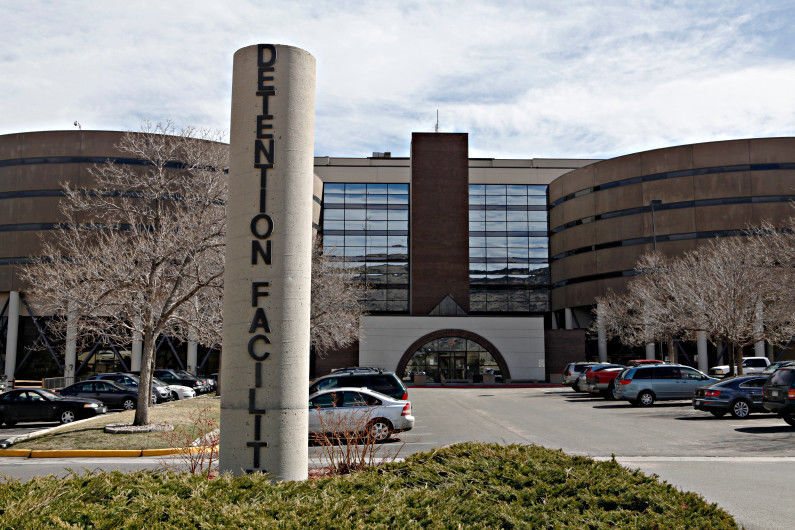Judge refuses to dismiss lawsuit against Jeffco, jail contractor for alleged constitutional violation

A federal judge has refused to dismiss a man’s lawsuit against Jefferson County and its medical contractor, Wellpath, for allegedly ignoring a life-threatening dental condition during his nearly six-month stay in the jail.
As part of the Eighth Amendment’s prohibition on cruel and unusual punishment, jail and prison staff cannot be deliberately indifferent to a detainee’s serious medical needs. Ronald Raymond Rogacki alleged that a roster of Wellpath employees in the Jeffco jail failed to do the obvious thing that would solve his chronic sinus infection – extract his teeth.
The defendants moved to dismiss Rogacki’s lawsuit, arguing it was not an Eighth Amendment violation for medical providers to pursue a different course of treatment than a detainee requests. In response, U.S. District Court Judge Charlotte N. Sweeney agreed with that basic principle.
“However, the Court agrees with Mr. Rogacki that he alleges the Wellpath Defendants failed to treat his harmful sinus infection at all, not that he disagreed with any treatment,” she wrote in an Oct. 31 order.
Michael Fairhurst, an attorney for Rogacki, said his client was able to obtain the dental care he needed after his release from jail, but suffered permanent jaw and sinus damage. He attributed the lasting effects to Wellpath’s alleged withholding of proper treatment.
“This is part and parcel with the way Wellpath does business,” Fairhurst said. “The Jefferson County jail also has an extensive history of providing woefully inadequate medical care, which has resulted in numerous serious injuries and deaths and cost taxpayers millions of dollars.”
Neither lawyers for Wellpath nor spokespersons for the Jefferson County Sheriff’s Office immediately responded to a request for comment on Sweeney’s order.
Rogacki was serving a sentence in the Jefferson County jail from August 2019 through January 2020. According to Rogacki’s lawsuit, his doctor informed him months prior that his teeth needed pulled to address a sinus infection Rogacki contracted in 2018. During a previous stay in the jail, dentist John O. Bertagnolli also reportedly opined Rogacki needed a “full-mouth extraction.”
However, according to Rogacki, from the time he filed his first medical request on Aug. 27, 2019 and through his approximately 27 other requests for help, Wellpath employees took no steps toward extracting the problematic teeth.
Among Rogacki’s allegations, Bertagnolli removed stiches from a prior extraction of Rogacki’s teeth, but otherwise suggested Rogacki wait until his time at the jail “is up.” Nurse Monica Albers responded belatedly or dismissively to Rogacki’s grievances. Physician David M. Jackson said he adopted a “watchful waiting” approach to Rogacki’s infection. Physician John J. Archard failed to facilitate Rogacki’s follow-up appointment with an ear, nose and throat specialist.
And nurse Courtney Slowey labeled Rogacki’s chronic sinus infection as “Conditions Not Requiring Medical Treatment.”
Meanwhile, Rogacki’s symptoms included continuous headaches, declining vision, dizzy spells and pus draining from his nose.
“Oral infection like Mr. Rogacki’s is serious and can even be deadly,” his attorneys wrote. “All the Individual Defendants were aware of the serious risks associated with failing to treat Mr. Rogacki’s oral infection quickly and adequately at all relevant times.”
Rogacki alleged the individual defendants were deliberately indifferent, which, under the Eighth Amendment, requires jail employees to know of and disregard a substantial risk to a detainee’s health or safety.
He also claimed Wellpath trained its employees on a “wait and see” approach as a cost-saving measure, given that the company pays for off-site medical care to detainees. Rogacki attempted to link his own lack of care with the recent deaths of other detainees in the jail, including Paul Abeyta, who died within months of Rogacki’s release, and John Kowalski, who died months before Rogacki’s incarceration.
As for Jefferson County, Rogacki argued the government had the ultimate duty to provide constitutionally-compliant medical care in the jail, notwithstanding its contract delegating medical responsibilities to Wellpath.
The defendants pushed back on Rogacki’s claims on several fronts. Lawyers for Jefferson County argued the county itself was not an appropriate party, and Rogacki had to sue either the board of county commissioners or the sheriff himself. Further, the “non-delegable duty” doctrine has never been endorsed by the U.S. Supreme Court or the federal appeals court covering Colorado, the county attorney’s office pointed out.
Wellpath, on the other hand, claimed Rogacki could not have experienced deliberate indifference to his serious medical needs because the allegations showed employees had repeatedly examined him in response to his concerns.
“Plaintiff admits that, during his five-month incarceration, he submitted approximately 28 healthcare requests and/or grievances, that Wellpath employees responded to each of his requests, and that he was seen at least 17 times by various medical and/or dental providers,” wrote attorneys for the company.
“Although these providers did not perform the extractions during Plaintiff’s August 2019 incarceration,” they added, “Plaintiff is not entitled to the medical treatment of his choosing.”
Sweeney agreed with Jeffco that suing “Jefferson County” was not appropriate. However, she recognized Rogacki would have a viable claim by merely substituting the board of county commissioners or the sheriff as a defendant, and permitted him 14 days to do so.
Otherwise, Sweeney found the allegations stated a plausible constitutional violation against each defendant. If Wellpath’s purported “wait and see” policy was a factor in Rogacki’s inadequate dental care, the company itself could be liable for deliberate indifference, as well as Jeffco for delegating its responsibilities to Wellpath.
The judge also agreed the individual Wellpath employees knew about the severity of Rogacki’s sinus infection but reportedly disregarded that risk.
For example, she wrote, “Slowey affirmatively misrepresented that (Rogacki’s) health problems had been ‘addressed’ or did not require medical treatment, underscoring that she recklessly disregarded the severity of the risks and symptoms of his sinus infection and did nothing to abate them.”
The case is Rogacki v. Jefferson County et al.














